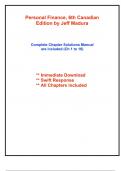Exam (elaborations)
Solutions for Personal Finance, 6th Canadian Edition by Madura (All Chapters included)
- Course
- Personal Finance 6ce Madura
- Institution
- University Of Alberta (UofA)
Complete Solutions Manual for Personal Finance, 6th Canadian Edition by Jeff Madura, Hardeep Singh Gill ; ISBN13: 9780138254834.....(Full Chapters included and organized in reverse order from Chapter 16 to 1)...1.Overview of a Financial Plan 2.Applying Time Value Concepts 3.Planning with Personal...
[Show more]



